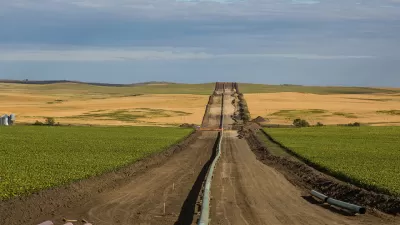With many oil pipelines stalled due to popular opposition and/or regulatory hurdles (e.g. Keystone XL and Northern Gateway, or even refineries opting for more flexibility) there seemed to be no end to the growth in moving oil by rail...until now.
Alison Sider writes that companies hoping to build rail terminals in Washington state capable of receiving the vast oil trains, also referred to as crude by rail or CBR, originating from the booming oil fields in the Bakken formation of North Dakota, are also encountering opposition.
The terminals are necessary to ship or barge the oil to refineries in Washington, Oregon, California and elsewhere, "(b)ut getting a permit in Washington is proving more challenging than companies expected." The "Lac Mégantic" effect is playing a role.
"The whole enterprise raises serious concerns about the heightened risk of transporting crude by rail," said Devorah Ancel, a staff attorney for the Sierra Club, an environmental advocacy group that has opposed some of the crude-by-rail projects at Washington ports.
There are economic advantages to building rail terminals in Washington state for receiving oil from North Dakota, now the second largest oil-producing state after Texas, producing over 1 million barrels a day (which includes neighboring states that compose the Williston Basin). It costs refiners only $10 barrel, "compared with $13 to $16 for a barrel of crude to travel by rail to California and $16 to ship a barrel to the East Coast," writes Sider.
But projects planned for some of the state's ports, where oil would be unloaded from trains, stored in tanks, and transferred to barges, have attracted criticism. A state hearing board recently overruled the City of Hoquiam, southwest of Seattle, which had issued permits to expand two terminals at the Port of Grays Harbor, west of Tacoma, to handle crude.
Pipeline projects that encountered opposition, in addition to Keystone XL, include the Northern Gateway in British Columbia, and the Freedom Pipeline from West Texas to California, which was dropped after California refineries opted to receive crude-by-rail.
However, the news is not all bad in the oil pipeline business. Keystone XL's southern leg, from Cushing, Okla., to the Gulf Coast at Port Arthur, Tex. will be operational on Jan. 3, reported the Huffington Post on Dec. 3.
FULL STORY: Moving Crude by Railcar Stalls on the Track

What ‘The Brutalist’ Teaches Us About Modern Cities
How architecture and urban landscapes reflect the trauma and dysfunction of the post-war experience.

‘Complete Streets’ Webpage Deleted in Federal Purge
Basic resources and information on building bike lanes and sidewalks, formerly housed on the government’s Complete Streets website, are now gone.

The VW Bus is Back — Now as an Electric Minivan
Volkswagen’s ID. Buzz reimagines its iconic Bus as a fully electric minivan, blending retro design with modern technology, a 231-mile range, and practical versatility to offer a stylish yet functional EV for the future.

Healing Through Parks: Altadena’s Path to Recovery After the Eaton Fire
In the wake of the Eaton Fire, Altadena is uniting to restore Loma Alta Park, creating a renewed space for recreation, community gathering, and resilience.

San Diego to Rescind Multi-Unit ADU Rule
The city wants to close a loophole that allowed developers to build apartment buildings on single-family lots as ADUs.

Electric Vehicles for All? Study Finds Disparities in Access and Incentives
A new UCLA study finds that while California has made progress in electric vehicle adoption, disadvantaged communities remain underserved in EV incentives, ownership, and charging access, requiring targeted policy changes to advance equity.
Urban Design for Planners 1: Software Tools
This six-course series explores essential urban design concepts using open source software and equips planners with the tools they need to participate fully in the urban design process.
Planning for Universal Design
Learn the tools for implementing Universal Design in planning regulations.
City of Albany
UCLA Lewis Center for Regional Policy Studies
Mpact (formerly Rail~Volution)
Chaddick Institute at DePaul University
City of Piedmont, CA
Great Falls Development Authority, Inc.
HUDs Office of Policy Development and Research



























